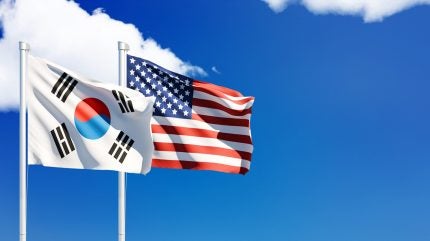
The US and South Korea have released trade agreement details that include a $150bn (Won 217.6tn) Korean investment in US shipbuilding and a $200bn strategic investment earmarked for industrial sectors.
The announcement follows an October summit between South Korean President Lee Jae Myung and US President Donald Trump, during which both leaders reached an understanding to reduce US import tariffs on South Korean goods to 15% from 25%, reported Reuters.

Discover B2B Marketing That Performs
Combine business intelligence and editorial excellence to reach engaged professionals across 36 leading media platforms.
South Korea’s Industry Minister, Kim Jung-kwan, and US Commerce Secretary Howard Lutnick signed a memorandum of understanding (MoU) detailing the agreement’s framework.
The non-binding document outlines a 27-point plan for strategic investments.
According to the agreement, the projects to receive funding will be chosen by US President Donald Trump following discussions with officials in Seoul city.
Once decisions are made, South Korea is expected to transfer funds within a 45-day window.

US Tariffs are shifting - will you react or anticipate?
Don’t let policy changes catch you off guard. Stay proactive with real-time data and expert analysis.
By GlobalDataThis development comes after months of negotiations over recent US tariffs that had concerned many of the US’ trading partners.
South Korea is said to have been particularly anxious about steep duties on key exports including semiconductors and automobiles.
President Lee has positioned the deal as a move to convert economic threats into opportunities for growth and stability.
As per the agreement, South Korea will establish partnerships with the US in AI, shipbuilding, the nuclear sector, critical minerals, semiconductors, pharmaceuticals and energy.
A White House fact sheet confirmed that the US has granted approval for South Korea to build nuclear-powered submarines and will collaborate closely with Seoul to secure fuel supplies.
The agreement stipulates that the $200bn in cash investments from South Korea will be distributed in annual instalments not exceeding $20bn each year, as a measure to maintain Korean currency stability.
Both sides have agreed that these investments should not destabilise financial markets. Should instability arise, South Korea said it may request “adjustment in the amount and timing of the funding, and the United States will, in good faith, give due consideration to such request”.
Additionally, US tariffs on South Korean products such as automobiles will be reduced to 15% from 25%.
In the fact sheet, South Korea said it will eliminate its 50,000-unit cap on imports of vehicles from the US that comply with Federal Motor Vehicle Safety Standards (FMVSS) with no further modifications.
South Korea said it will ease regulatory requirements for US auto exports by accepting emissions certification documents already provided to US authorities, without asking for further paperwork.
On agricultural matters, both countries have agreed to streamline regulatory approvals for biotechnology products and address non-tariff barriers affecting food and agriculture trade.
This includes setting up a dedicated “US Desk” for requests related to US horticultural products and maintaining market access for US meats and cheeses.
The agreement further commits both countries to ensure that US companies do not face discrimination or needless restrictions under digital services regulations, including network usage fees and data transfers across borders.
South Korea has also pledged to spend $25bn on purchases of US military equipment by 2030 and outlined plans for comprehensive support totalling $33bn for “US Forces Korea” in compliance with domestic legal requirements.
In shipbuilding, both nations will work together through a dedicated working group focused on repairs, maintenance, workforce training, modernisation of shipyards and strengthening of supply chains.
The initiative is intended to rapidly increase the number of US commercial and military vessels, including through potential construction of US vessels in South Korea.
In line with the bilateral 123 agreement, and subject to US legal requirements, the US will also back the process leading to civil uranium enrichment and spent fuel reprocessing intended for peaceful purposes in South Korea.
President Trump also announced new trade deals with Argentina, El Salvador, Guatemala and Ecuador.
These agreements include commitments on economic and security cooperation designed to bolster supply chains and open up markets in Central and South America for US exporters.
The fact sheet said: “The deals will help US farmers, ranchers, fishermen, small businesses and manufacturers to increase US exports to and expand business opportunities with these trading partners.”





